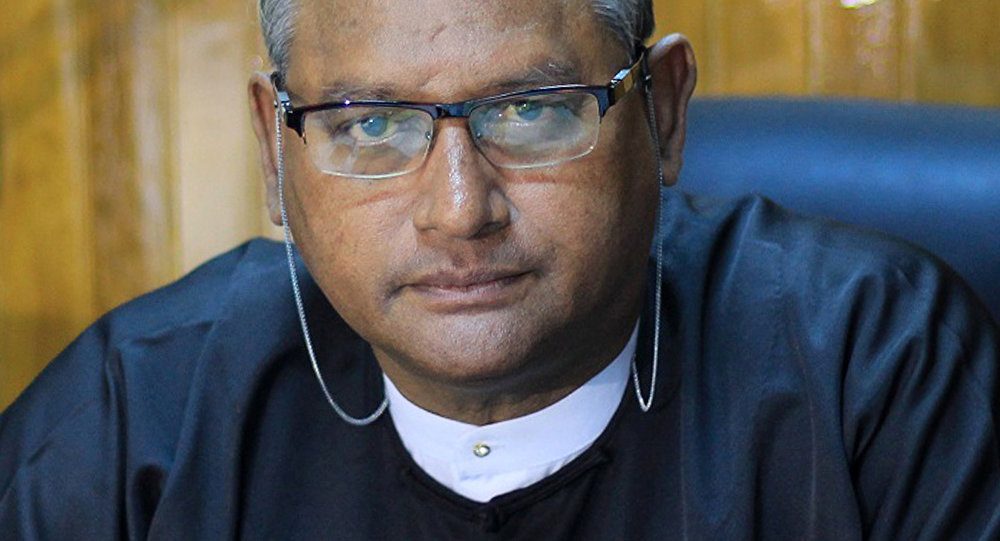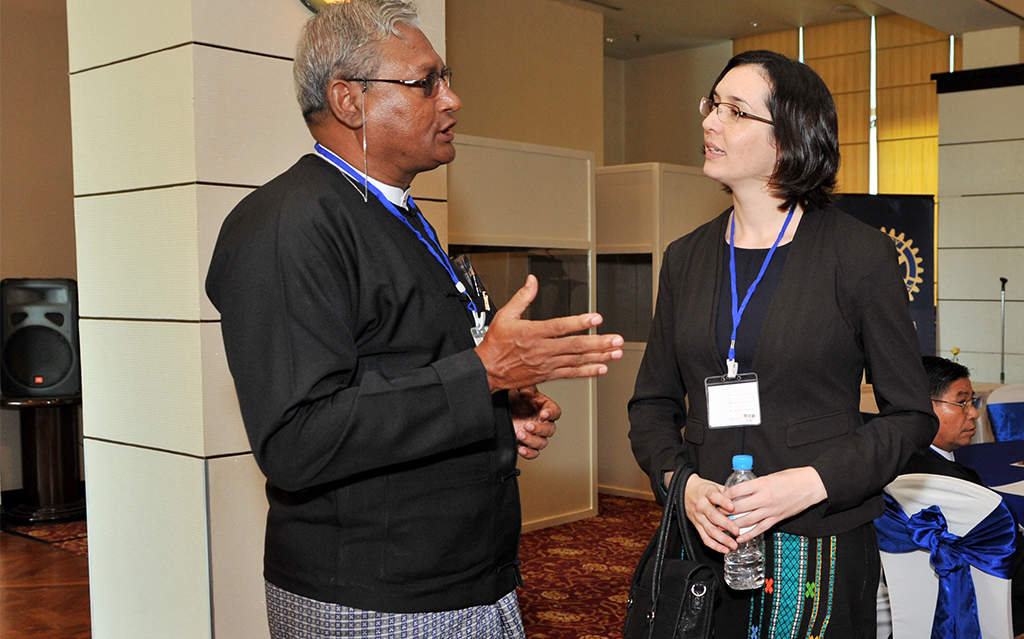On Sunday, prominent Muslim lawyer, and legal adviser to Aung San Suu Kyi, U Ko Ni, was fatally shot by an alleged assassin. Melissa Crouch reflects on the life and legacy of Myanmar’s legal voice of conscience.
This week people in Myanmar were forced to confront the kind of country that it is becoming. On 29 January 2017, U Ko Ni, a prominent lawyer and legal advisor, was tragically assassinated at Yangon International Airport. He was returning from a trip to Indonesia with the Information Minister U Pe Myint. U Ko Ni was outspoken in his advocacy for law reform and was also a well-known Muslim in majority-Buddhist Myanmar.
His untimely death is an unspeakable loss for the country.
Ko Ni was born near Katha in Saigang Division in 1953, and was the son of a Muslim father from India and a Burmese mother. This was not unusual for the time. In the early 1900s, his father came to Burma through his work with the British Indian army. Burma at the time was considered to be part of the British Indian colonial empire. His mother was a Burmese Buddhist, although she herself was also the daughter of a Muslim father and a Buddhist mother.
In the town where he grew up, he recalls a small Muslim community, of perhaps 180 families or 1,000 people. He completed his schooling in Katha and passed his matriculation by the early 1970s. His schooling was in Burmese (not English) because this was largely during the socialist period.
When I asked him why he decided to become a lawyer, his response was that his mother told him to become one because he was good at arguing. His great oratory skills were clearly developing at an early age. He also met a lawyer in Katha who he recalls was a true gentleman and who had earned the respect of many people in town. He became interested in studying law because of this man and the encouragement of his mother.
Ko Ni entered Yangon University in the early 1970s. He resided at Ava Hall, one of the dormitories on campus for students. He completed a four-year BA degree and then a one year LLB course, as was the common path to study law at the time. There were about 180 students in his BA course, and about 50-60 of them were women. His favourite subjects were civil law and evidence. He said that his favourite professor was U Tin Ohn, the Head of Department.
When asked about whether particular professors were an inspiration to him, he recalls two kinds of teachers. There were the permanent staff, most of them women, who were admired by the students for their dedication and tireless service to their students. The other type of lecturers were part-time and included many famous lawyers, retired judges or retired officials from the Attorney General’s Office who gave up their time to lecture to students.
U Ko Ni was in his fourth year of study when the socialist government introduced the 1974 Constitution. He recalls the 1972 referendum to approve the draft socialist constitution. From his memory, most of the students objected to the draft Constitution that would see the country shift from parliamentary democracy to a one-party, unicameral parliament and socialist-military state. On the day of voting he remembers that polling booths were set up around the campus with a black box with a cross for ‘no’ votes, and a white box for ‘yes’ votes. Many of the students put their votes in the black box. Yet by the evening, the socialist regime had announced that most of the students had voted in favour of the 1974 Constitution. This was clearly false, he said.
When he was contemplating what to do after his degree, a university teacher suggested he work for U Ko Yu, a famous criminal lawyer and a former lecturer at the university. In the late 1970s, he did just that and recalls the strong influence U Ko Yu had on him. He learnt two things from him – how to teach and how to be a good lawyer.
His chamber master U Ko Yu contributed to the Bar Council statement regarding the 1988 democracy uprisings and he was at one time a Central Executive Committee member of the National League for Democracy. I never asked U Ko Ni how much his own political ideas had been influenced by the example of U Ko Yu. U Ko Ni became qualified as a Higher Grade Pleader and became a member of the Yangon Bar Association in 1978. During that time U Ko Ni also worked as a teacher at the Yangon University of Distance Education. He recalls learning closely from other senior lawyers at the time such as U Maung Maung Aye.
Before 1988, he moved from U Ko Yu’s office and established his own small chambers in his house, mostly focusing on civil law. In 1994, he established Laurel Law Firm with seven lawyers. He would become a highly popular Advocate (senior lawyer) and chamber master himself. In 2014, he told me that he had supervised over 100 chambers students.
We talked only briefly about 1988, the pro-democracy uprising that was brutally crushed by the military in Myanmar. He did once mention his involvement in a political party at the time, which was later banned by the military regime. He mentioned that he had young children at the time and felt the responsibility as a father of having to earn a living and care for his family.
U Ko Ni was a frequent commentator on legal affairs in the media, and lectured to a range of audiences from young lawyers to senior members of parliament. He was outspoken on a wide range of legal issues from the need for constitutional change, the right to peaceful protest, to the thorny issue of hate speech. He also part of group of lawyers who demonstrated to protest the government’s proposed sale of the High Court and the Police Commissioners Office that was rumoured to be turned into a hotel.
He was even of the view that the parliament could suspend section 59(f) of the Constitution, the provision that is regarded as barring Daw Aung San Suu Kyi from becoming president. This was one demonstration of his deep understanding of constitutional issues from the 1950s, when a provision of the 1947 Constitution was suspended.
Yet he could never escape the fact that he was Muslim. Since 2012, anti-Muslim violence had spread from Rakhine State to many major towns in Myanmar. A new radical Buddhist movement had emerged, inciting further anti-Muslim sentiment. It was in this context that things became increasingly difficult and politicised for many Muslims in Myanmar, including for U Ko Ni.
In February 2014, U Ko Ni was prevented from giving a public speech at an NLD event in North Okkalapa township, after monks demanded that he and another Muslim lawyer should not be allowed to speak.
In 2015, in the lead-up to the historic elections in Myanmar, things took a turn for the worse for the Muslim community, particularly for the Rohingya in Rakhine State. White card holders (those with ‘temporary’ identity cards) were barred from running for political office or from voting. Many white card holders are Muslim. This ran contrary to political practice, as white card holders had been allowed to vote and run for public office in the 1990 elections and the 2010 elections. U Ko Ni was critical of the Constitutional Tribunal’s ruling on this matter.
In addition, U Ko Ni was outspoken against the NLD for what he perceived to be its decision not to field any Muslim candidates and not to appoint any Muslim candidates to the Central Executive Committee. I recall the deep frustration and despair with which he spoke about this issue at the time. He was under no illusions that this may have been because of the intimidation tactics of radical Buddhist monks.
While the international media have often labelled him as a ‘Muslim lawyer’ and as a legal advisor for the National League for Democracy, he needs to be remembered as so much more than that. I often recall him emphasising that he saw himself as independent, and he became more emphatic about this as the NLD caved to pressures of radical Buddhist groups in recent years.
U Ko Ni was a regular at our Australia-Myanmar Constitutional Democracy Project events on constitutionalism from 2013 to the present. The learning, however, was very much mutual. We are deeply indebted to the time he gave us and his expertise added immeasurably to our workshops on constitutional democracy. His patience and support of our endeavours were sincerely appreciated.
Over the years, he leant support to a range of lawyers’ organisations and advocacy causes. He more recently become involved in the Myanmar Muslim Lawyers Association, although it seems that he did so only out of a sense of necessity and the need to defend the basic rights of Muslims.
In August 2016, U Ko Ni was particularly concerned when I spoke to him on the phone about the current situation. I had never heard him talk in such pessimistic tones before, his concern for people’s safety, human rights and security paramount. He warned that it was not safe for locals to be talking in public forums about constitutional or human rights issues, but encouraged us to continue to do so.
In November 2016, my colleagues and I visited U Ko Ni at his new office. He was so proud to welcome us and we discussed many constitutional issues at great length that day.
It has been a privilege and honour to sit at the feet of great legal minds such as U Ko Ni. More than once he would go out of his way to buy books for me that he knew I was looking for.
There are many other things that can be said about U Ko Ni. He was also a devoted family man, husband, father and grandfather. He was not only concerned about the future for his children, but also for the future of Myanmar as a country.
When preparing the book Islam and the State in Myanmar, I briefly profiled several prominent Myanmar Muslim figures of the past who made substantial contributions to the history of Burma, such as U Raschid (who served in several government positions during the period of parliamentary democracy 1948-1962 before being imprisoned twice for several years during the socialist era) and U Razak (who was assassinated along with General Aung San on 19 July 1947).
I did not mention contemporary figures such as U Ko Ni, despite him becoming a key voice in the period of democratisation in Myanmar. It seems far too early to have to write a tribute for a man who should have been a voice for legal reform in Myanmar for many years to come.
U Ko Ni needs to be remembered alongside some of the great legal minds and Muslim public figures in Myanmar’s history. He was a respected and prominent legal advisor who knew the personal risks that speaking out entails in a majority-Buddhist country emerging from decades of military rule.
Now more than ever, Myanmar needs more voices like U Ko Ni.
Dr Melissa Crouch, Senior Lecturer, University of New South Wales. This tribute is based on audio recordings and field notes of in-depth interviews with U Ko Ni over the past few years.
 Facebook
Facebook  Twitter
Twitter  Soundcloud
Soundcloud  Youtube
Youtube  Rss
Rss 
